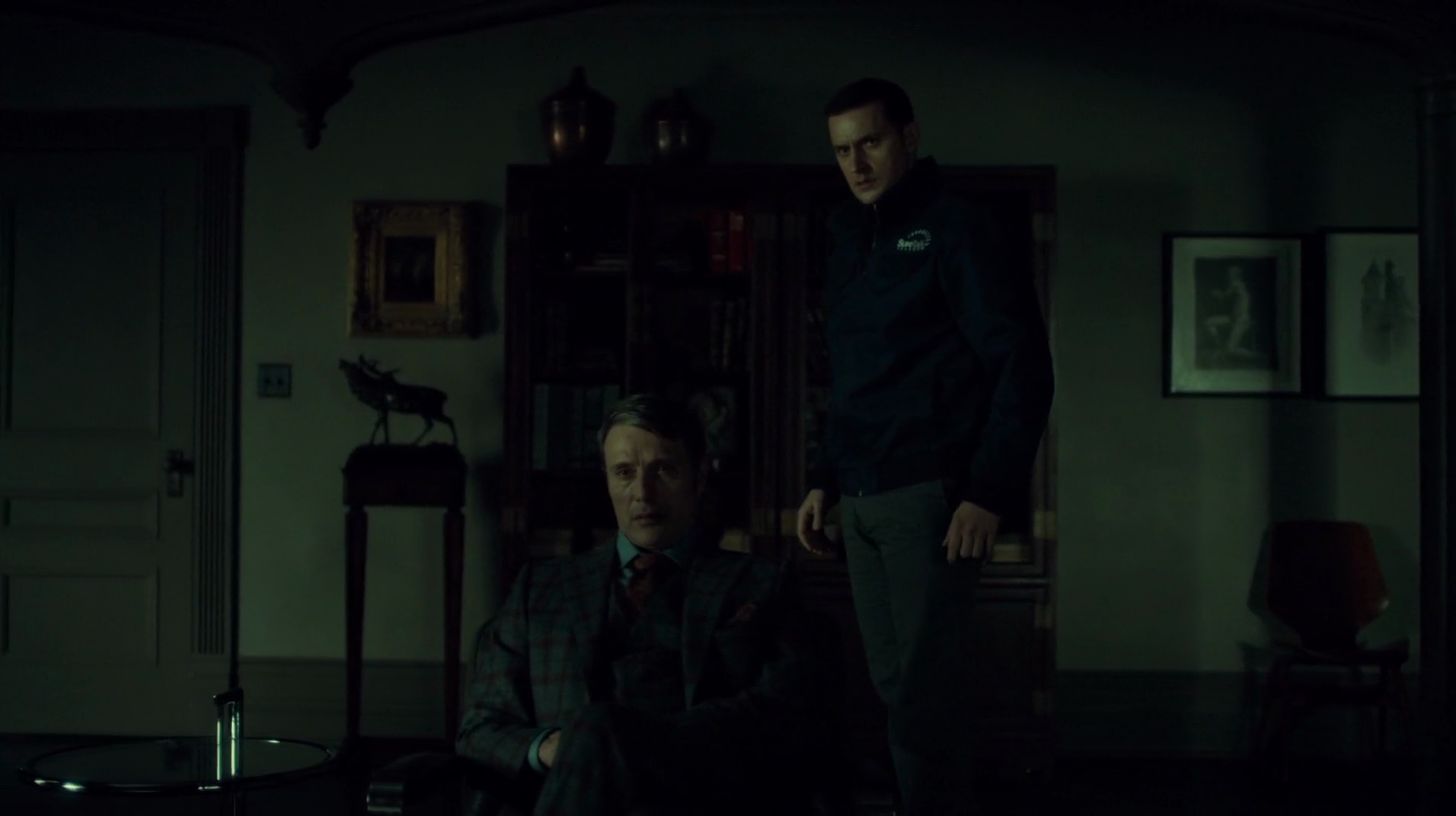Pop Between Realities, Home in Time for Tea: Captain America: The Winter Soldier, The Lego Movie, It Follows
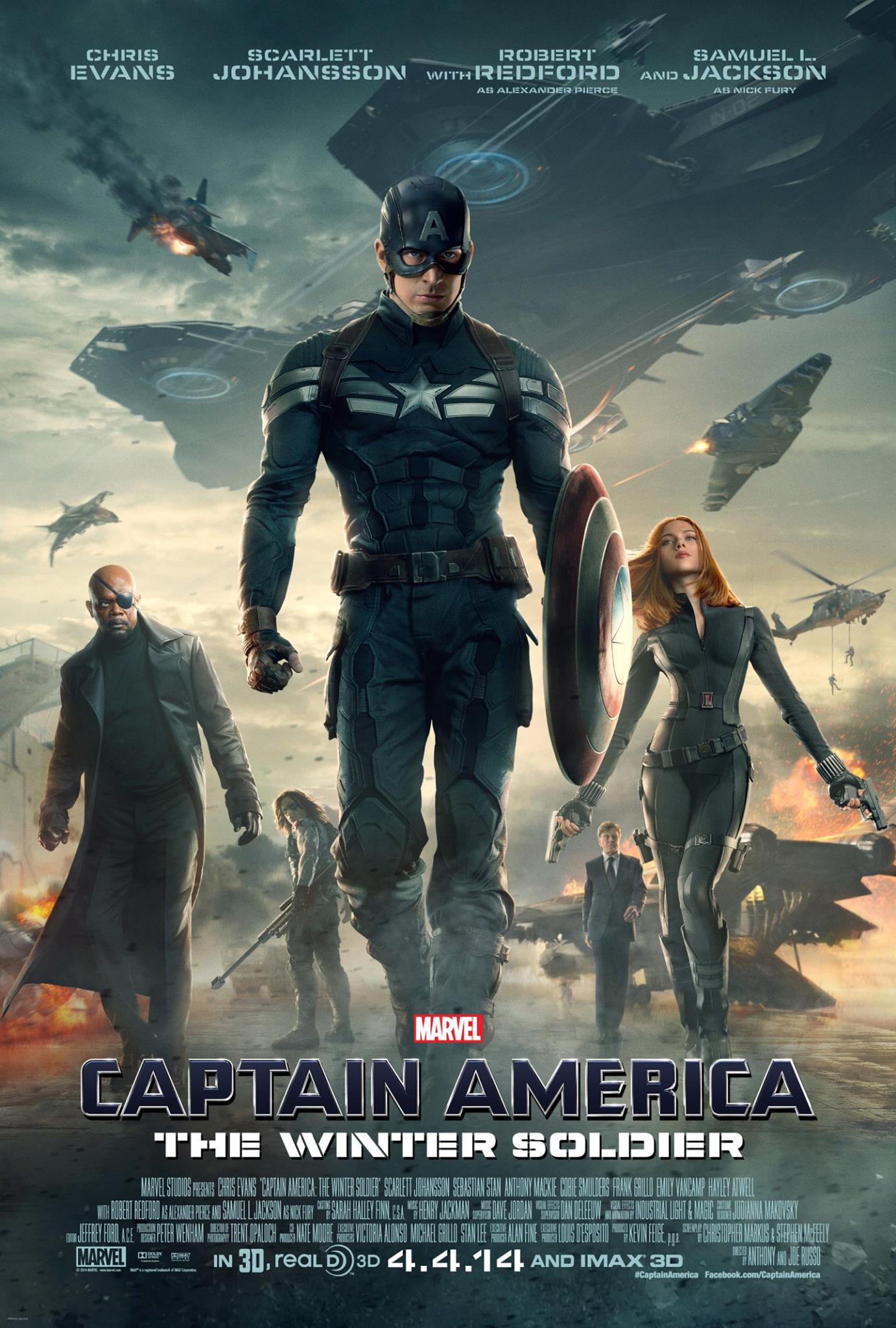 By rights, Moffat should have left. Sure, he’d done a season less than Davies, but it was clearly time. Each of his three seasons had been a step down from the one before, with Series Seven being an openly miserable experience. The Day of the Doctor and Matt Smith’s departure provided an occasion where he could leave on a high. His style had become exceedingly recognizable and recognized, which is the phase right before utter stagnation. It was time to go, and if he didn’t he risked—indeed, given the tenacity of his critics, essentially ensured—that there would be accusations that he stayed too long. But, of course, he didn’t. He retrenched, got a new star and executive producer, and went back to try again. This is the story of how that went, and of what may be Doctor Who’s most unexpected golden age.
By rights, Moffat should have left. Sure, he’d done a season less than Davies, but it was clearly time. Each of his three seasons had been a step down from the one before, with Series Seven being an openly miserable experience. The Day of the Doctor and Matt Smith’s departure provided an occasion where he could leave on a high. His style had become exceedingly recognizable and recognized, which is the phase right before utter stagnation. It was time to go, and if he didn’t he risked—indeed, given the tenacity of his critics, essentially ensured—that there would be accusations that he stayed too long. But, of course, he didn’t. He retrenched, got a new star and executive producer, and went back to try again. This is the story of how that went, and of what may be Doctor Who’s most unexpected golden age.
But to understand that unexpectedness we must first understand the landscape that Doctor Who was returning into. Because the problem wasn’t just that Moffat’s tenure looked long in the tooth on its own merits. It was that outside Doctor Who’s window, the world was catching up. In one sense this was not a surprise. Doctor Who was onto its eighth season, and while obviously it had an unusually strong precedent for long runs, the new iteration was definitely a televisual senior citizen. But it’s worth appreciating the degree to which both Doctor Who and Moffat’s defining arsenal of tricks had been absorbed into the popular culture.
The obvious place to start is with the relentless blockbuster factory that is the Marvel Cinematic Universe. Quietly chugging along in the background since the late Russell T Davies era, by 2014 Marvel was well into Phase Two of their cinematic expansion, going back over the franchises they’d used to build up to The Avengers to give them sequels while introducing a handful of new ones alongside them. The wisecracking sci-fi action-comedy of Guardians of the Galaxy might seem the more obvious 2014 comparison, but its primary debt is clearly to Star Wars, and anyway, it’s the whole we’re interested in more than the individual parts. Because what the MCU does on aggregate is apply a relatively consistent narrative structure to a bevy of different genres.
This isn’t done in the exact same way that Doctor Who does it, of course. Doctor Who has a narrative conceit that directly fuels its genre hopping. The Doctor can drop into any sort of story they please and muck it up. The MCU, on the other hand, accomplishes its genrefluidity by having access to any character Marvel hadn’t already sold off to Fox or Sony. And so over the course of Phase Two it moves from a technothriller to high fantasy to a political thriller to a Star Wars riff to its big crossover set piece before closing out with a heist comedy. And by Phase Three it’s cycling in even more approaches. The result moves more slowly than Doctor Who—only the political thriller and the Star Wars riff come out in 2014, for instance.…

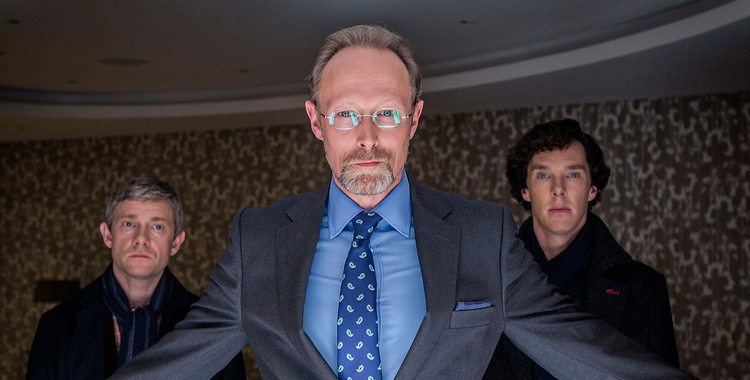 It’s January 12th, 2014. Pharrell Williams is happily at number one, with Beyonce, Eminem, Ellie Goulding, and Pitbull also charting. In news, a cold snap in the US has all fifty states with at least somewhere below freezing, and a chemical leak in West Virginia leaves 300,000 without clean water. In the UK, the death of Mark Duggan, which kicked off riots in the summer of 2011, is ruled to have been lawful, while Keith Wallis pleads guilty for falsely claiming to have heard Andrew Mitchell call some police officers “plebs.”
It’s January 12th, 2014. Pharrell Williams is happily at number one, with Beyonce, Eminem, Ellie Goulding, and Pitbull also charting. In news, a cold snap in the US has all fifty states with at least somewhere below freezing, and a chemical leak in West Virginia leaves 300,000 without clean water. In the UK, the death of Mark Duggan, which kicked off riots in the summer of 2011, is ruled to have been lawful, while Keith Wallis pleads guilty for falsely claiming to have heard Andrew Mitchell call some police officers “plebs.”  THE WRATH OF THE LAMB: Reframing the title scheme for the back half of the season away from “Blake paintings” and towards “lines from Revelation,” and not entirely honestly. The title drop in the proceeding episode forces single vision, such that it can only refer to Will’s vengeance against Hannibal, although it’s not as though it would have been long on ambiguity without that.
THE WRATH OF THE LAMB: Reframing the title scheme for the back half of the season away from “Blake paintings” and towards “lines from Revelation,” and not entirely honestly. The title drop in the proceeding episode forces single vision, such that it can only refer to Will’s vengeance against Hannibal, although it’s not as though it would have been long on ambiguity without that.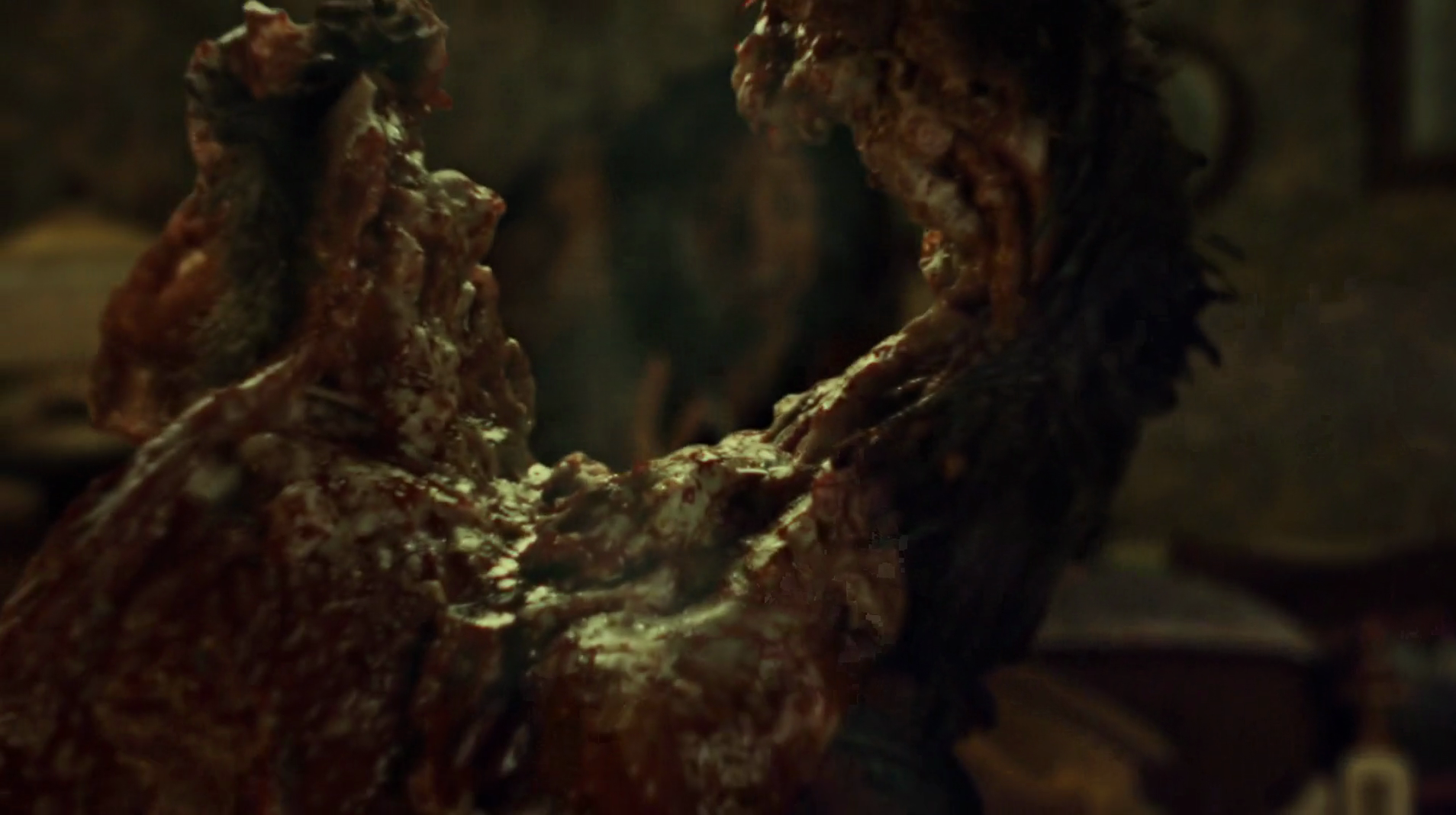
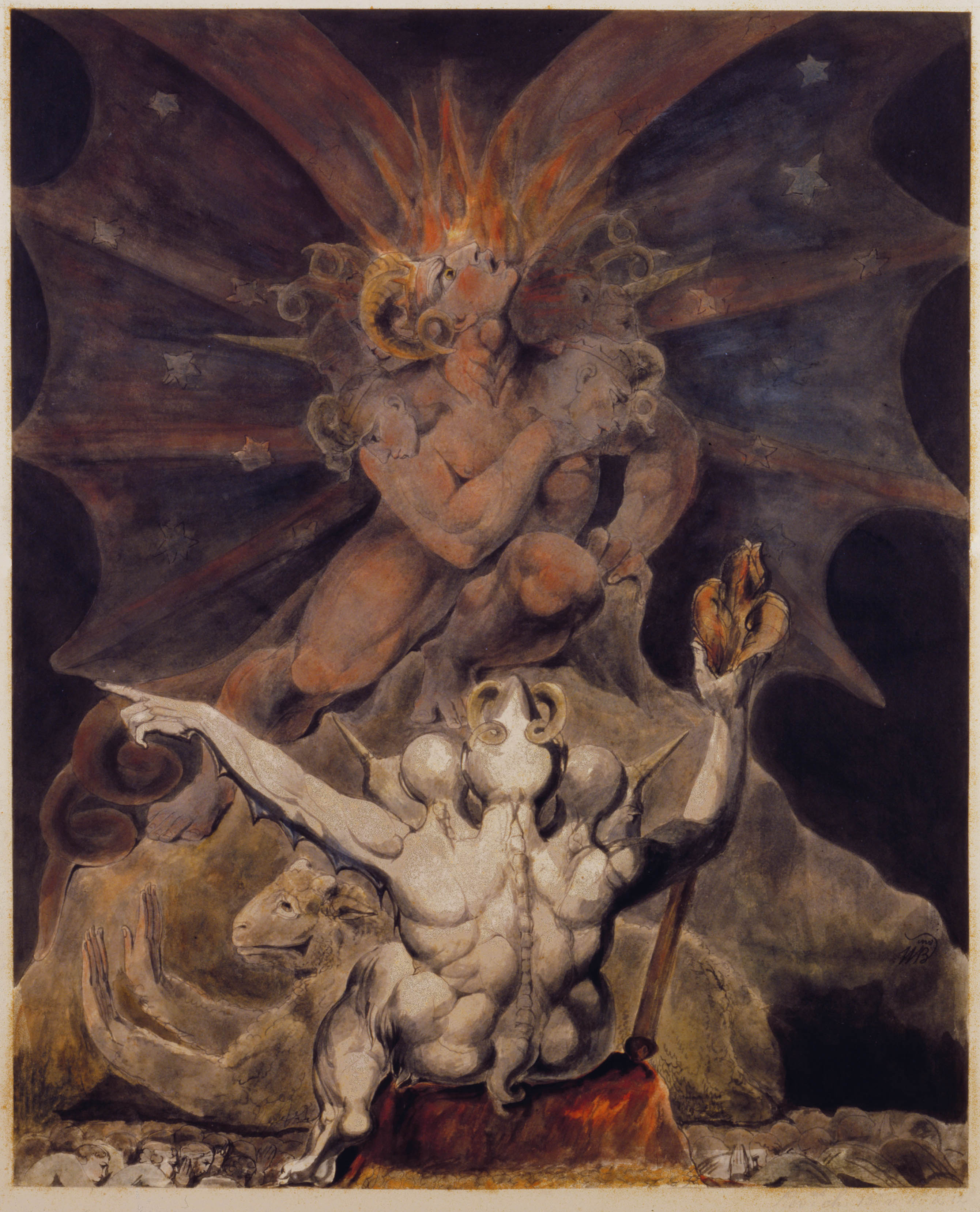 THE NUMBER OF THE BEAST IS 666: Last and in most ways least, it is to “The Great Red Dragon and the Beast from the Sea” what “The Great Red Dragon and the Woman Clothed with the Sun” is to “The Great Red Dragon and the Woman Clothed in Sun”—a drabber and less chilling counterpart. The dragon is in an awkward pose that serves to expose the limitations of Blake’s anatomy, his face flattened in profile in such a way as to lose all animalistic grandeur. It is the one of the paintings to arguably look better when Fuller and company recreate it in “And the Woman Clothed in Sun.” Its one interesting element is the lamb-like figure behind the Beast from the Sea, a point of contrast and dissonance that enlivens the whole.
THE NUMBER OF THE BEAST IS 666: Last and in most ways least, it is to “The Great Red Dragon and the Beast from the Sea” what “The Great Red Dragon and the Woman Clothed with the Sun” is to “The Great Red Dragon and the Woman Clothed in Sun”—a drabber and less chilling counterpart. The dragon is in an awkward pose that serves to expose the limitations of Blake’s anatomy, his face flattened in profile in such a way as to lose all animalistic grandeur. It is the one of the paintings to arguably look better when Fuller and company recreate it in “And the Woman Clothed in Sun.” Its one interesting element is the lamb-like figure behind the Beast from the Sea, a point of contrast and dissonance that enlivens the whole.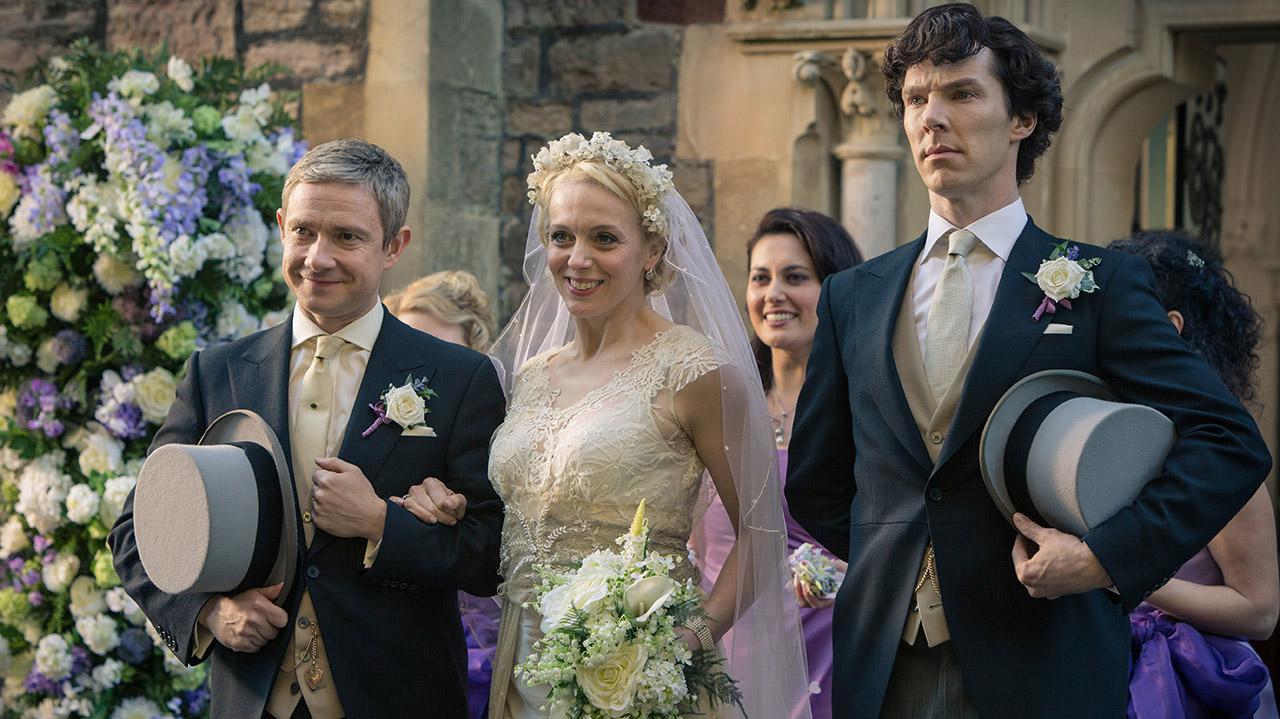 We continue to count down towards the TARDIS Eruditorum relaunch on March 19th with revised versions of some old blog posts on Sherlock. Proverbs of Hell will run its final two installments on Tuesday and Thursday this week.
We continue to count down towards the TARDIS Eruditorum relaunch on March 19th with revised versions of some old blog posts on Sherlock. Proverbs of Hell will run its final two installments on Tuesday and Thursday this week.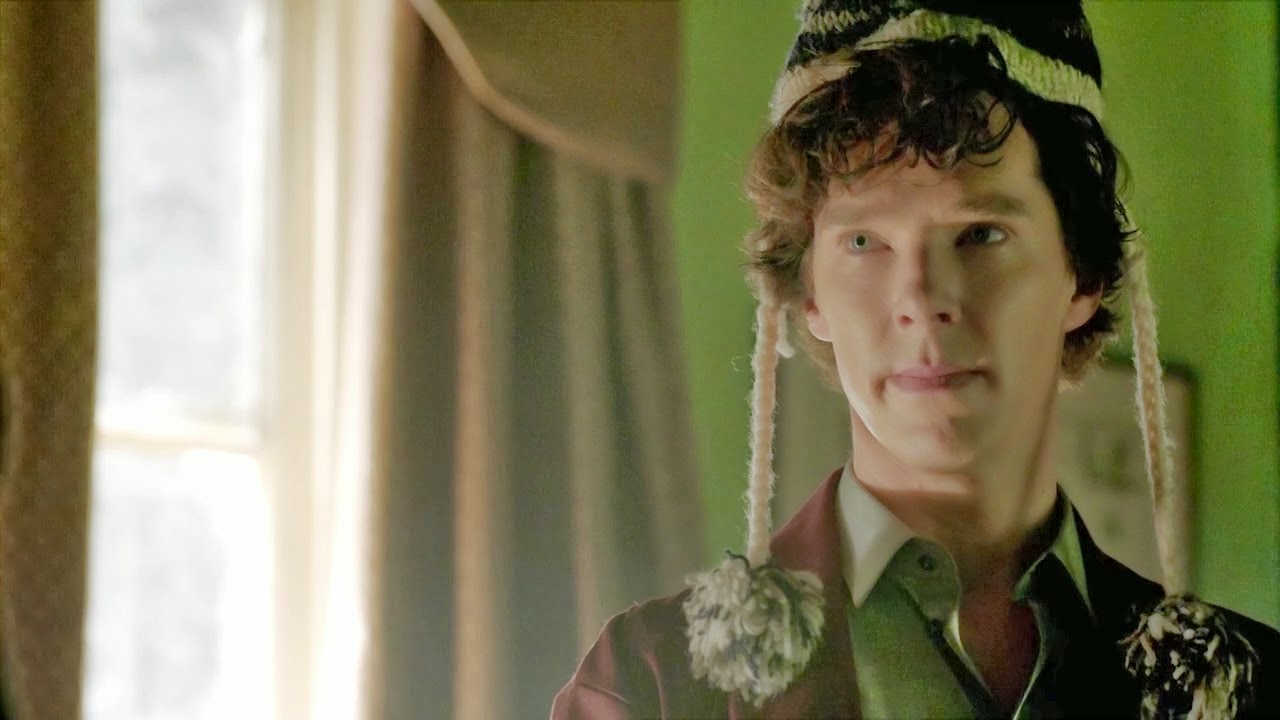 It’s January 1st, 2014. Pharrell Williams’s “Happy” has unseated Sam Bailey at number one, while Eminem and Rihanna, Lily Allen, Ellie Goulding, Katy Perry, and One Direction also chart. In the news, since Matt Smith got old and died it’s been exceedingly quiet. Obama signed a budget deal, marijuana was legalized in Colorado, incandescent light bulbs became illegal to sell in the United States, and Latvia adopted the Euro. While on television, Sherlock informed the audience that it was going to lie to them, and then went on to do just that. It had, in the tradition of fair lies, given ample warning. “It’s a trick. Just a magic trick.” And so, of course, it was. Indeed, The Empty Hearse is in effect a ninety minute exercise in arguing that the question of how Sherlock survived The Reichenbach Fall is irrelevant, or at least largely uninteresting.
It’s January 1st, 2014. Pharrell Williams’s “Happy” has unseated Sam Bailey at number one, while Eminem and Rihanna, Lily Allen, Ellie Goulding, Katy Perry, and One Direction also chart. In the news, since Matt Smith got old and died it’s been exceedingly quiet. Obama signed a budget deal, marijuana was legalized in Colorado, incandescent light bulbs became illegal to sell in the United States, and Latvia adopted the Euro. While on television, Sherlock informed the audience that it was going to lie to them, and then went on to do just that. It had, in the tradition of fair lies, given ample warning. “It’s a trick. Just a magic trick.” And so, of course, it was. Indeed, The Empty Hearse is in effect a ninety minute exercise in arguing that the question of how Sherlock survived The Reichenbach Fall is irrelevant, or at least largely uninteresting.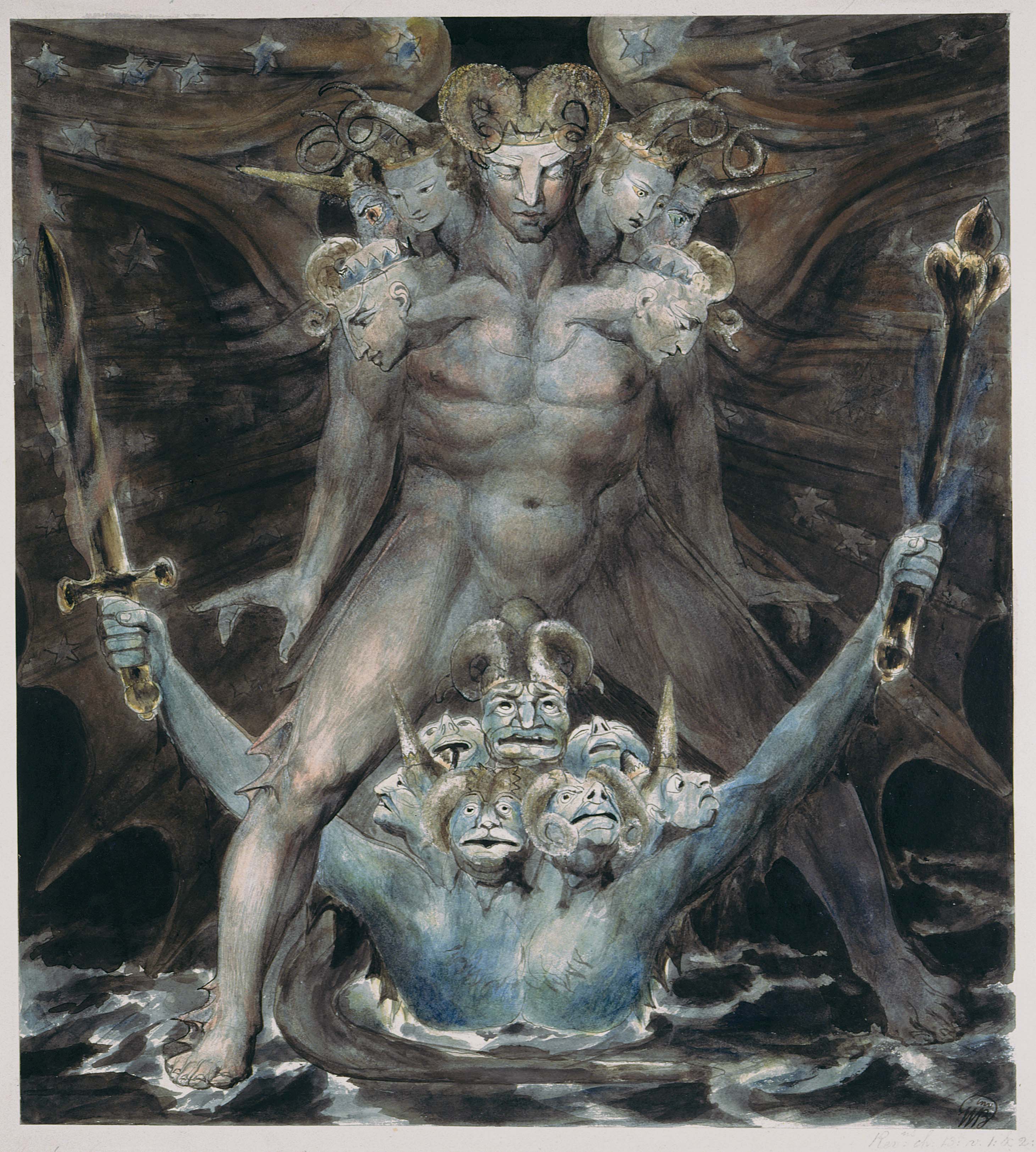 AND THE BEAST FROM THE SEA: The one painting in the series not to have a direct representation or invocation in the series. The tense sexuality that exists between the Dragon and the Sun-Clothed Woman is replaced here by a raw homoeroticism—a theme that is not entirely uncommon in Blake. (c.f. Object 47 of Milton a Poem) The Beast from the Sea appears in Revelation 13, one verse after the Dragon, and is said to be given his power by the Dragon, creating a sense of heritage or supplanting. In Blake, the Beast rises below the Dragon, but has clear dominion over him. Of course, that’s always how supplantation begins.
AND THE BEAST FROM THE SEA: The one painting in the series not to have a direct representation or invocation in the series. The tense sexuality that exists between the Dragon and the Sun-Clothed Woman is replaced here by a raw homoeroticism—a theme that is not entirely uncommon in Blake. (c.f. Object 47 of Milton a Poem) The Beast from the Sea appears in Revelation 13, one verse after the Dragon, and is said to be given his power by the Dragon, creating a sense of heritage or supplanting. In Blake, the Beast rises below the Dragon, but has clear dominion over him. Of course, that’s always how supplantation begins. 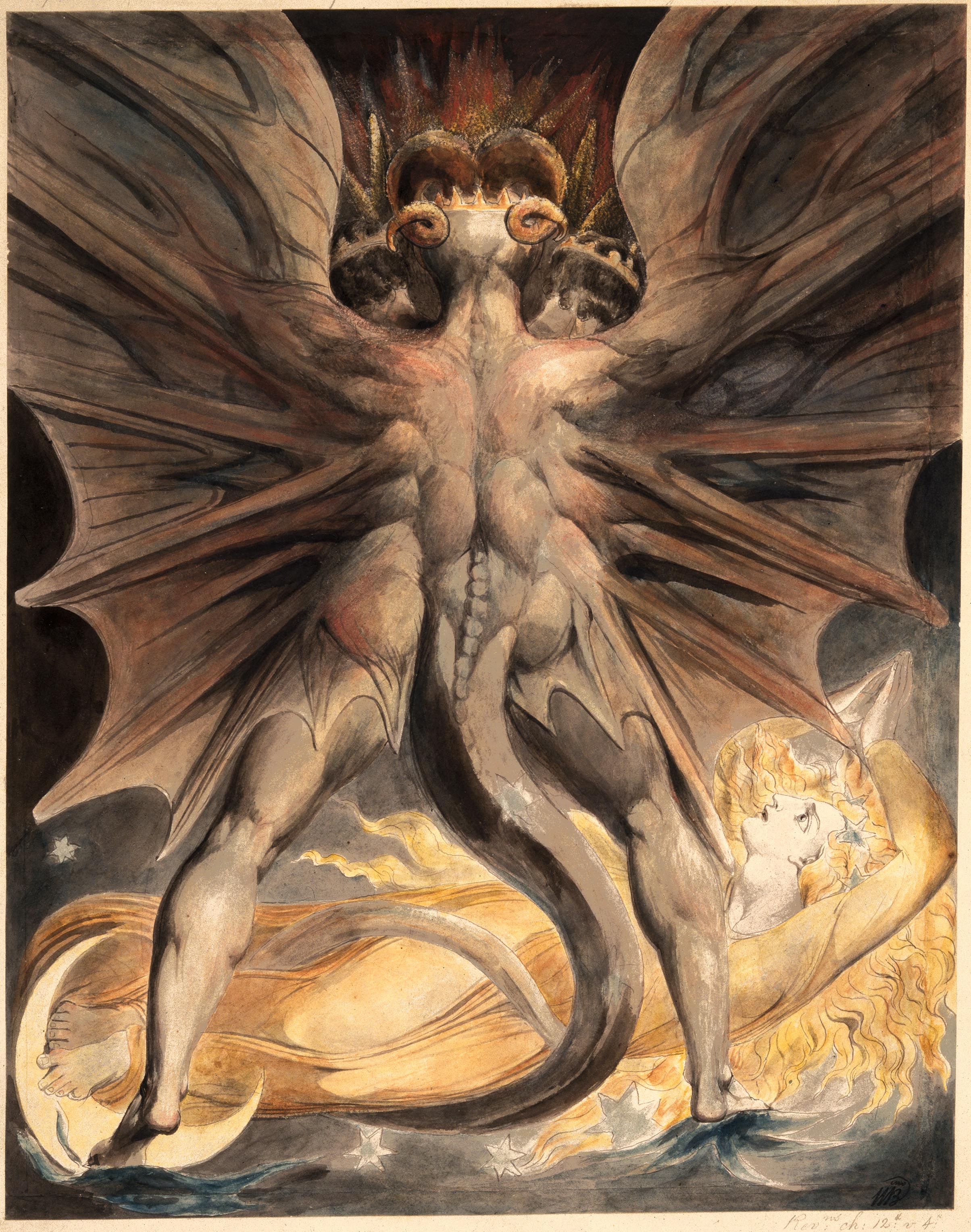 AND THE WOMAN CLOTHED IN SUN: The big one. Hannibal describes its “unique and nightmarish charge of demonic sexuality,” which is fair enough, but seems desperately insufficient. Let’s add, then, a brief discussion of gaze. As John Berger memorably simplifies it, in art the norm is that “men look at women. Women watch themselves being looked at.” Which at least broadly describes this picture, sure, in that we are seeing a woman being looked at. But the woman is obscured in the picture. We watch her being looked at, yes, but we do not really see her ourselves. That picture is The Great Red Dragon and the Woman Clothed With the Sun. Here the object of our gaze is, as they say, dat ass. This isn’t so much a charge of demonic sexuality as a stunningly homoerotic vision of erotic puissance. Dolarhyde, clearly, does not miss the point nearly so much.
AND THE WOMAN CLOTHED IN SUN: The big one. Hannibal describes its “unique and nightmarish charge of demonic sexuality,” which is fair enough, but seems desperately insufficient. Let’s add, then, a brief discussion of gaze. As John Berger memorably simplifies it, in art the norm is that “men look at women. Women watch themselves being looked at.” Which at least broadly describes this picture, sure, in that we are seeing a woman being looked at. But the woman is obscured in the picture. We watch her being looked at, yes, but we do not really see her ourselves. That picture is The Great Red Dragon and the Woman Clothed With the Sun. Here the object of our gaze is, as they say, dat ass. This isn’t so much a charge of demonic sexuality as a stunningly homoerotic vision of erotic puissance. Dolarhyde, clearly, does not miss the point nearly so much.